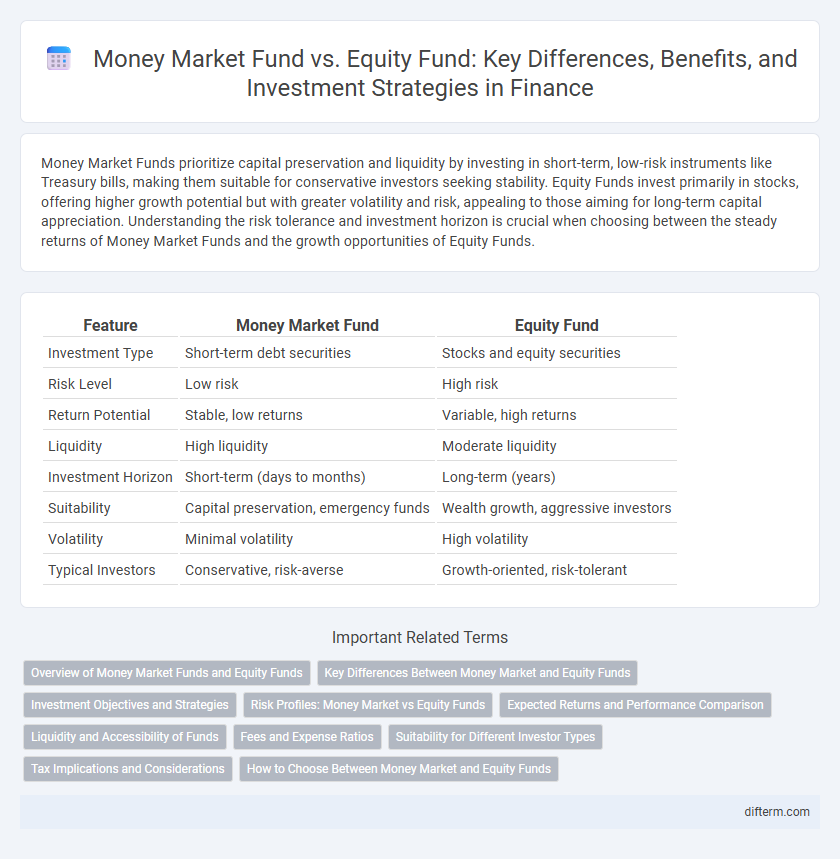Money Market Funds prioritize capital preservation and liquidity by investing in short-term, low-risk instruments like Treasury bills, making them suitable for conservative investors seeking stability. Equity Funds invest primarily in stocks, offering higher growth potential but with greater volatility and risk, appealing to those aiming for long-term capital appreciation. Understanding the risk tolerance and investment horizon is crucial when choosing between the steady returns of Money Market Funds and the growth opportunities of Equity Funds.
Table of Comparison
| Feature | Money Market Fund | Equity Fund |
|---|---|---|
| Investment Type | Short-term debt securities | Stocks and equity securities |
| Risk Level | Low risk | High risk |
| Return Potential | Stable, low returns | Variable, high returns |
| Liquidity | High liquidity | Moderate liquidity |
| Investment Horizon | Short-term (days to months) | Long-term (years) |
| Suitability | Capital preservation, emergency funds | Wealth growth, aggressive investors |
| Volatility | Minimal volatility | High volatility |
| Typical Investors | Conservative, risk-averse | Growth-oriented, risk-tolerant |
Overview of Money Market Funds and Equity Funds
Money Market Funds invest in short-term, high-quality debt securities such as Treasury bills and commercial paper, providing high liquidity and low risk. Equity Funds purchase shares of publicly traded companies, offering higher potential returns alongside greater volatility and market risk. Investors often choose Money Market Funds for capital preservation and quick access to funds, while Equity Funds are preferred for long-term growth and wealth accumulation.
Key Differences Between Money Market and Equity Funds
Money Market Funds primarily invest in low-risk, short-term debt instruments like Treasury bills and commercial paper, offering high liquidity and capital preservation with lower returns. Equity Funds allocate assets to stocks, targeting higher long-term growth potential but with increased volatility and risk. The key differences lie in risk tolerance, investment horizon, and expected returns, making Money Market Funds suitable for conservative investors and Equity Funds ideal for those seeking aggressive growth.
Investment Objectives and Strategies
Money Market Funds prioritize capital preservation and liquidity by investing in short-term, high-quality debt instruments like Treasury bills and commercial paper, aiming for low risk and stable returns. Equity Funds focus on capital appreciation through investing in stocks of companies across various sectors, targeting higher long-term growth with increased volatility. Investment strategies for Money Market Funds emphasize minimizing risk and maintaining liquidity, whereas Equity Funds employ active stock selection and portfolio diversification to optimize growth potential.
Risk Profiles: Money Market vs Equity Funds
Money market funds offer low-risk investment options by primarily investing in short-term, high-quality debt instruments, making them ideal for conservative investors seeking capital preservation and liquidity. Equity funds carry higher risk due to their exposure to stock market volatility but provide greater potential for long-term capital growth. Understanding the distinct risk profiles of money market versus equity funds helps investors align their portfolios with their risk tolerance and investment objectives.
Expected Returns and Performance Comparison
Money Market Funds typically offer lower expected returns, averaging around 1-3% annually, due to their investment in short-term, low-risk instruments like Treasury bills and commercial paper. Equity Funds tend to deliver higher potential returns, often ranging from 7-10% per year, driven by investments in stocks that fluctuate with market performance and economic growth trends. Performance comparison reveals that Money Market Funds provide stability and capital preservation, while Equity Funds exhibit greater volatility but stronger long-term growth potential.
Liquidity and Accessibility of Funds
Money Market Funds offer high liquidity and ease of access, allowing investors to quickly withdraw funds with minimal risk and no significant loss of principal. Equity Funds, while potentially yielding higher returns, typically have lower liquidity and may require longer holding periods due to market volatility and trading restrictions. Investors prioritizing immediate access to cash often prefer Money Market Funds over Equity Funds for short-term financial needs.
Fees and Expense Ratios
Money market funds typically have lower fees and expense ratios, ranging from 0.1% to 0.5%, compared to equity funds that often charge between 0.5% and 1.5%. The lower expenses of money market funds reflect their conservative investment strategies focused on short-term debt instruments. Higher fees in equity funds cover active management, research, and the potential for higher returns through stock investments.
Suitability for Different Investor Types
Money market funds suit conservative investors seeking capital preservation and liquidity, offering low risk and stable returns through investments in short-term, high-quality debt instruments. Equity funds are ideal for growth-oriented investors comfortable with higher volatility, aiming for long-term capital appreciation by investing in diverse stocks. Risk tolerance, investment horizon, and financial goals determine the suitability of each fund type for individual investors.
Tax Implications and Considerations
Money market funds typically offer lower tax rates on interest income as it is often taxed at ordinary income tax rates, whereas equity funds generate capital gains and qualified dividends, which may benefit from lower long-term capital gains tax rates. Investors in equity funds should consider the potential tax liability from realized capital gains distributions during the year, while money market funds generally produce more predictable, taxable income. Understanding these tax implications helps investors optimize after-tax returns based on their income bracket and investment horizon.
How to Choose Between Money Market and Equity Funds
When choosing between money market and equity funds, consider your risk tolerance and investment horizon--money market funds offer lower risk and high liquidity, suitable for short-term needs and capital preservation, while equity funds provide higher growth potential with greater volatility ideal for long-term wealth accumulation. Assess your financial goals, time frame, and income requirements to determine the appropriate asset allocation. Diversifying investments across both fund types can balance stability and growth within your portfolio.
Money Market Fund vs Equity Fund Infographic

 difterm.com
difterm.com